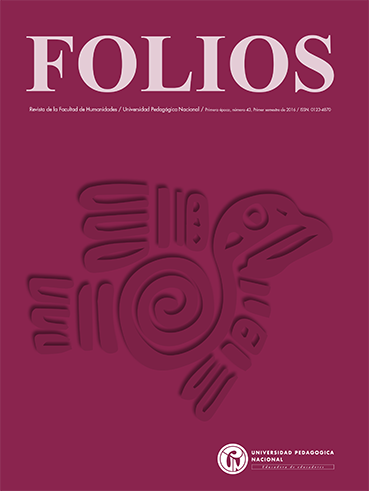Historias de vida: una manera de explorar experiencias e identidades de aprendices de lengua en un contexto de inglés como lengua extranjera
Resumen
Este trabajo explora las experiencias de la vida real en torno al aprendizaje de idiomas y de identidades que emergen teniendo en cuenta el acto de posicionamiento dentro de una perspectiva situada. Pensando en el aprendiz de la lengua como un sujeto con la capacidad de actuar, el estudio da cuenta del alumno con poder y sin poder tal cual como se narra en las historias de vida. El estudio tomó en cuenta elementos analíticos de la teoría fundamentada (Charmaz, 2006) para acercarse a la historia de vida como unidad de análisis. Los datos recogidos revelaron que los alumnos se resisten al posicionamiento dentro del ambiente de aprendizaje y, como resultado, pueden actuar. El análisis también arrojó luz sobre la importancia de tener en cuenta no solo los antecedentes lingüísticos, sino también la experiencia, para llegar a comprender a los alumnos desde una perspectiva no solo ontológica, sino narrativa.
Citas
Ahearn, L. M. (2001). Language and agency. Annual Review of Anthropology, 30, 109–137.
Anderson, B. (1991). Imagined communities: reflection on the origins and spread of nationalism. London: Verso.
Atkinson, R. (1998). The life story interview. Thousand Oaks, CA: Sage Publications.
Ausubel, D. P. & Fitzgerald, D. (1962). Organizer, general background, and antecedent learning variables in sequential verbal learning. Journal of Educational Psychology, 53 (6), 243-249.
Bandura, A. (1986). Social foundations of thought and action: a social cognitive theory. Englewood Cliffs, NJ: Prentice Hall. Bakhtin, M. (1981). The dialogic imagination. Austin: University of Texas Press.
Bandura, A. (2001). Social cognitive theory: An agentic perspective. Annual Review of Psychology, 52, 1–26.
Barkhuizen, G., Benson, P., Chik, A. (2014). Narrative inquiry in language teaching and learning research. New York, NY: Routledge
Baxter, J. (2002). Competing discourses in the classroom: a post-structuralist discourse analysis of girls’ and boys’ speech in public contexts. Discourse and society, 13 (6), 827-842.
Bell, J. C. (2002). Narrative inquiry: More than just telling stories. TESOL Quarterly: 36 (2), 207-213.
Blackledge, A. and A. Pavlenko. (2001). Negotiation of identities in multilingual contexts. The International Journal of Bilingualism, 5(3): 243–57.
Benson, P., & Nunan, D. (2014). Learners’ stories: Difference and diversity in language learning. Cambridge: Cambridge University Press.
Berger, P. L. & Luckmann, T. (1966). The Social Construction of Reality: A Treatise in the Sociology of Knowledge. New York: Anchor.
Bernstein, B. (2000). Pedagogy, symbolic control and identity: Theory, Research Critique. Lanham: Rowman & Littlefield publishers.
Bruner, J. (1990). Acts of meaning. Cambridge MA: Harvard University Press
Bruner, J. (1986). Actual minds, possible worlds. Cambridge MA: Harvard University Press.
Charmaz, K. (2006). Constructing grounded theory. A practical guide through qualitative analysis. London: Sage.
Clandinin, D. J. and Connelly, F. M. (2000). Narrative inquiry experience and story in qualitative research. San Francisco: Jossey-Bass Publishers.
Clandinin, D. J. and Connelly, F.M. (2000) Narrative Inquiry. In J. Green, G. Camilli, & P. Elmore, Handbook of complementary methods in education research.
Corder, S. P. (1967). The significance of learner's errors. IRAL: International Review of Applied Linguistics in Language Teaching. 5(4): 161-170.
Davies, B. & Harre, R. (1999). Positioning and personhood. In: R. Harre & L. van Langenhove. Positioning theory: moral contexts of inventional action. Oxford: Blackwell.
Davies, B., and R. Harre. (1990). Positioning: the discursive production of selves. Journal for the Theory of Social Behavior. 20 (1), 43–63.
De Fina, A. & Georgakopoulou, A. (2012). Analyzing Narrative: Discourse and sociolinguistic perspectives. Cambridge: Cambridge University Press.
Ellis R. (1997). Second Language Acquisition. Oxford: Oxford University Press.
Fairclough, N. (1992). Discourse and social change. Cambridge, England: Polity Press.
Firth, A. & Wagner, J. (1997) On discourse, communication, and some fundamental concepts in SLA research. Modern Language Journal, 81(3), 235-300.
Foucault, M. (1970). The order of things: An archeology of the human sciences. New York, NY: Pantheon.
Foucault, M. (1974). The archeology of knowledge. London: Tavistock.
Gao, X. (2010). Autonomous language learning against all odds. System, 38 (4), 580-90.
Johnson, K. E. & Golombek, P. R. (2011). The transformative power of narrative in second language teacher education. TESOL Quarterly, 45 (3), 486-508.
Juffs, A. (1996). Learnability and lexicon. Theories and second language acquisition research. Amsterdam: John Benjamins.
Kerby, A. P. (1991). Narrative and the self. Bloomington, IN: Indiana University Press.
Kumaravadivelu, B. (2012). Individual identity, cultural globalization and teaching English as an international language: The case for an epistemic break. Teaching English as an International Language: Principles and Practices. Alsagoff, L., Renandya, W., Hu, Guangwei & McKay, S. (Eds.). New York: Routledge.
Lantolf, J. (2000). Sociocultural theory and second language learning. Oxford: Oxford University Press.
Le Page, R. (1986). Acts of identity. English today, 8, 21-24.
Linehan, C., & McCarthy, J. (2000). Positioning in practice: Understanding participation in the social world. Journal for the Theory of Social Behaviour, 30, 435-453.
McAdams, D. P. (1993). Personal myths and the making of the self. New York: Guildford Press.
Martinez and Roldan, C. (2003). Building worlds and identities: A case study of the role of narratives in bilingual literature discussions. Research in the Teaching of English, 37, 491-52. Miller, J. (2003). Audible difference: ESL and social identity in schools. Clevedon: Multilingual Matters.
Norton, B. (2000). Identity and language learning: Gender, ethnicity and educational change. London: Longman/Pearson Education.
Norton, B., & Toohey, K. (2001). Changing perspectives on good language learners. TESOL Quarterly, 35 (2), 307-322.
Pavlenko, A. (2007). Autobiographic narratives as data in applied linguistics. Applied Linguistics, 28 (2), 163-188.
Reeve, J. & Tseng, C. M. (2011). Agency as a fourth aspect of students’ engagement during learning activities. Contemporary Educational Psychology, 36, 257–267.doi:10.1016/j.cedpsych.2011.05.002.
Roberts, B. (2002). Biographical research. Buckingham, UK: Open University Press.
Rubdy, R. (2009). Reclaiming the local in teaching EIL. Language and intercultural communication, 9, 156-74.
Sikes, P., & Gale, K. (2006). Narrative approaches to educational research: research in education. Retrieved from: http://www.edu.plymouth.ac.uk/resined/narrative/narrativehome.htm.
Stanley, L. and Temple, B. (2008). Narrative methodologies: subjects, silences, reading and analyses’. Qualitative Research, 8, 275-81.
Taylor, S. (2003). A place for the Future? Residence and continuity in women’s narratives of their lives, Narrative Inquiry, 13, 193-215.
Van Langenhove, L., & Harre, R. (1999). Introducing positioning theory. In R. Harre, & L. van Langenhove (Eds.). Positioning theory. Oxford: Blackwell Publishers Ltd.
Weedon, C. (1987). Feminist practice and poststructuralist theory. London: Blackwell.
Weber, M. (1991). The nature of social action. In Runciman WG (ed.). Weber: Selections in Translation. Cambridge: Cambridge University Press.
Wenger, E. (1998). Communities of practice: Learning, meaning, and identity. Cambridge: Cambridge University Press.
Vygotsky, L. S. (1978). Mind in society: The development of higher psychological processes. Cambridge, MA: Harvard University Press.
Vygotsky, L. S. (1987). Thinking and speech. In R. W. Rieber & A. S. Carton (Eds.). The collected works of L. S. Vygotsky. Vol. 1. Norris Minick (Trans.). New York and London: Plenum, 243–286.
Descargas
Derechos de autor 1969 Revista Folios

Esta obra está bajo una licencia internacional Creative Commons Atribución-NoComercial 4.0.




























